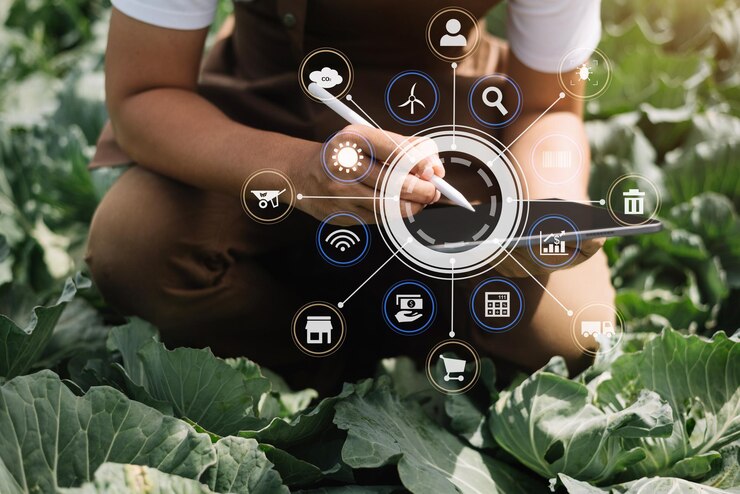In a world grappling with climate change, population growth, and environmental degradation, the future of agriculture and food systems is more critical than ever. Sustainable practices are no longer just a buzzword; they are a necessity for ensuring food security, preserving natural resources, and mitigating the impacts of climate change. However, achieving sustainable food systems presents a myriad of challenges that require innovative solutions and concerted efforts from various stakeholders.
1. Climate Change and Environmental Degradation:
Climate change poses significant threats to agriculture, including unpredictable weather patterns, increased frequency of extreme events like droughts and floods, and the spread of pests and diseases. Additionally, unsustainable agricultural practices such as deforestation, monocropping, and excessive use of chemical fertilizers and pesticides contribute to environmental degradation, soil erosion, and loss of biodiversity.
2. Food Insecurity and Hunger:
Despite advancements in agricultural technology and increased food production, millions of people still suffer from food insecurity and hunger globally. Inequitable distribution of resources, lack of access to markets, and poverty exacerbate the problem, especially in developing countries. Achieving sustainable food systems requires addressing these systemic issues to ensure that everyone has access to nutritious and affordable food.
3. Water Scarcity and Pollution:
Agriculture accounts for a significant portion of global water usage, putting pressure on freshwater resources. Water scarcity, exacerbated by climate change and inefficient irrigation practices, threatens agricultural productivity and food security. Moreover, agricultural runoff containing pesticides, fertilizers, and livestock waste pollutes water bodies, affecting ecosystems and human health.
4. Loss of Biodiversity and Genetic Resources:
Intensive agricultural practices have led to the loss of biodiversity and genetic resources essential for food production and ecosystem resilience. Monocultures and the homogenization of crops increase vulnerability to pests and diseases, while also reducing the availability of diverse and nutritious foods. Conserving biodiversity and promoting agroecological approaches are crucial for building resilient food systems.
5. Socioeconomic Challenges and Equity:
Agriculture is not just about producing food; it is also about livelihoods, culture, and social well-being. Smallholder farmers, who play a vital role in food production, often face challenges such as limited access to land, markets, finance, and technology. Gender disparities further compound these challenges, with women disproportionately affected by poverty and lack of opportunities in agriculture.
Addressing these challenges requires a multifaceted approach that integrates social, economic, and environmental dimensions. Key strategies for building sustainable food systems include:
- Promoting agroecological practices that enhance biodiversity, soil health, and resilience to climate change.
- Investing in research and development of climate-smart agricultural technologies and practices.
- Strengthening local food systems and value chains to improve access to markets and reduce food waste.
- Empowering smallholder farmers, particularly women, through capacity building, access to resources, and market opportunities.
- Enhancing policy coherence and governance frameworks to support sustainable agriculture and food security at local, national, and global levels.
In conclusion, the challenges facing agriculture and food systems are complex and interconnected, requiring collaborative efforts and innovative solutions from governments, businesses, civil society, and consumers. By prioritizing sustainability, equity, and resilience, we can navigate the challenges ahead and build a more food-secure and environmentally sustainable future for generations to come.
Here are some additional topics related to agriculture, sustainable food systems, and the challenges ahead:
- Technology and Innovation in Agriculture:
- Exploring the role of emerging technologies such as artificial intelligence, blockchain, and vertical farming in revolutionizing agricultural practices and enhancing productivity, efficiency, and sustainability.
- Discussing the potential benefits and risks of genetically modified organisms (GMOs) and biotechnology in addressing food security challenges and improving crop resilience to climate change and pests.
- Urban Agriculture and Food Security:
- Examining the opportunities and challenges of urban agriculture in addressing food security, nutrition, and environmental sustainability in rapidly growing cities.
- Highlighting innovative urban farming practices such as rooftop gardens, hydroponics, and community gardens that contribute to local food production, job creation, and community resilience.
- Food Waste and Circular Economy:
- Analyzing the environmental, economic, and social impacts of food waste throughout the food supply chain and exploring strategies to reduce, recover, and recycle food waste.
- Discussing the concept of a circular economy in agriculture, where resources are used more efficiently, and waste is minimized through practices such as composting, anaerobic digestion, and food redistribution.
- Food Justice and Equity:
- Addressing issues of food justice, equity, and human rights in the global food system, including access to land, water, seeds, and markets for smallholder farmers and marginalized communities.
- Examining the role of food sovereignty movements in promoting community control over food production, distribution, and consumption and challenging corporate dominance in the food system.
- Agroecology and Regenerative Agriculture:
- Exploring the principles and practices of agroecology and regenerative agriculture as holistic approaches to farming that prioritize soil health, biodiversity, and resilience.
- Highlighting successful examples of agroecological and regenerative farming systems that enhance ecosystem services, reduce greenhouse gas emissions, and improve farmer livelihoods.
- Trade and Globalization in Agriculture:
- Analyzing the impacts of trade liberalization, globalization, and corporate consolidation on smallholder farmers, rural communities, and agricultural biodiversity.
- Discussing the need for fair and equitable trade policies that prioritize food sovereignty, environmental sustainability, and social justice.
Each of these topics offers opportunities for in-depth exploration and discussion, shedding light on the complexities of the agricultural sector and the urgent need for transformative change to ensure a sustainable and equitable food future.
